Here's a typical paean to the school system in Finland written in 2018:
10 reasons why Finland's education system is the best in the world
No amount of pontificating will change what we already know. The American education system needs to be completely revamped — from the first grade to the Ph.D.
....Finland is the answer — a country rich in intellectual and educational reform has initiated over the years a number of novel and simple changes that have completely revolutionized their educational system. They outrank the United States and are gaining on Eastern Asian countries.
Sounds fabulous! Let's see how Finland is doing these days:
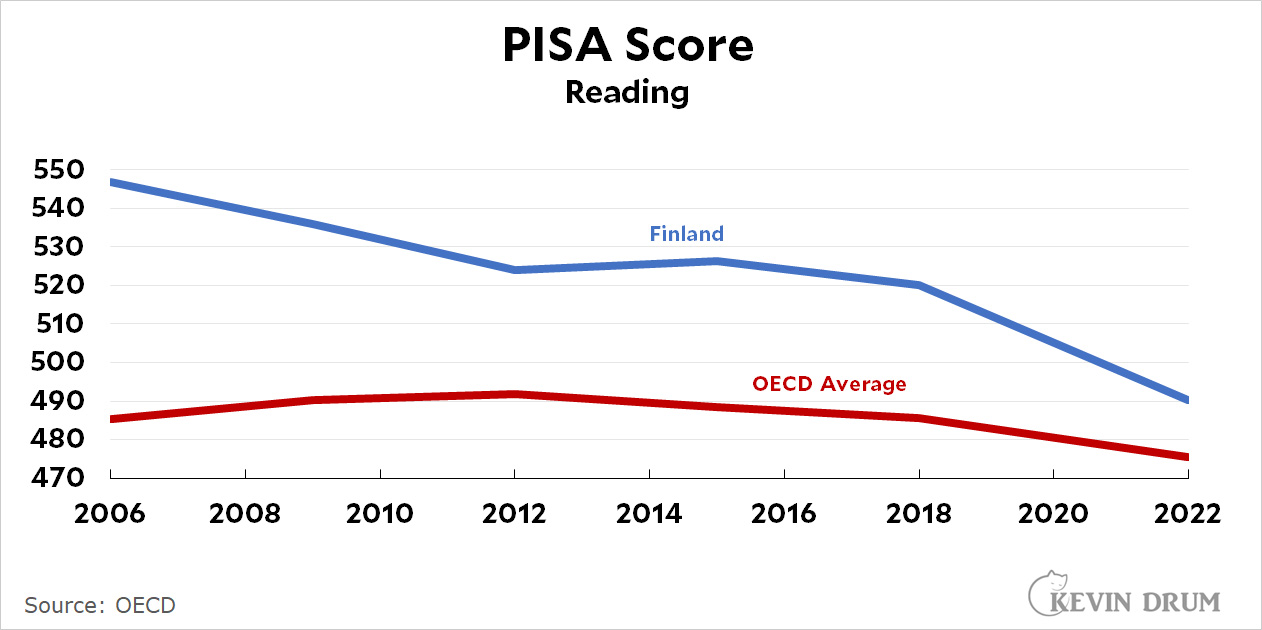
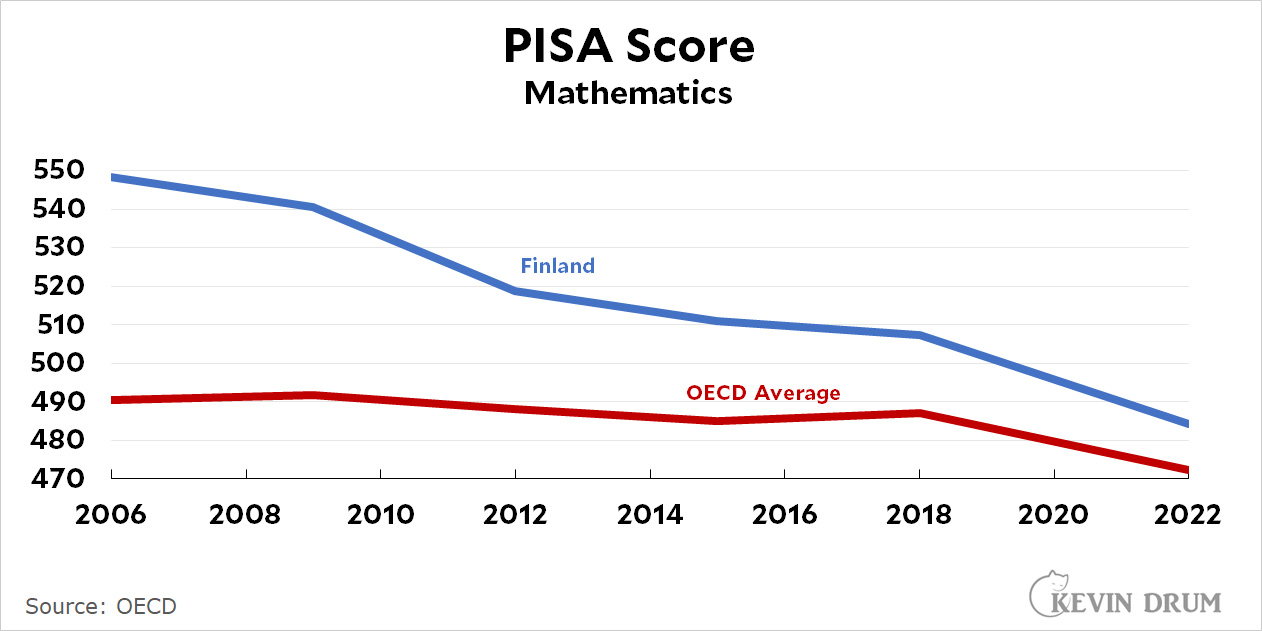 Finland used to be far ahead of the OECD average of rich countries. But it's been declining for nearly 20 years and is now only slightly ahead. Finland is very much middle-of-the-pack today, ranking behind Switzerland, Canada, the Netherlands, Belgium, Denmark, Britain, and, of course, Japan and South Korea. That's in math. They do better in reading, but are still behind Canada, Britain, Ireland, Australia, Japan, South Korea, and (surprise!) the United States.
Finland used to be far ahead of the OECD average of rich countries. But it's been declining for nearly 20 years and is now only slightly ahead. Finland is very much middle-of-the-pack today, ranking behind Switzerland, Canada, the Netherlands, Belgium, Denmark, Britain, and, of course, Japan and South Korea. That's in math. They do better in reading, but are still behind Canada, Britain, Ireland, Australia, Japan, South Korea, and (surprise!) the United States.
In other words, there was no secret sauce in Finland. In fact, there are no secrets at all. The problem the United States has with its educational system is simple and extremely well known: we do a crappy job of teaching poor Black and Hispanic kids. Among countries of 10 million or more, US scores for white kids are the highest in the world in reading and fourth highest in math (behind Japan, Taiwan, and South Korea).
That's on the PISA test, anyway, which is decidedly not the final word on student performance. But it's widely cited, so it's worth knowing how the US does.

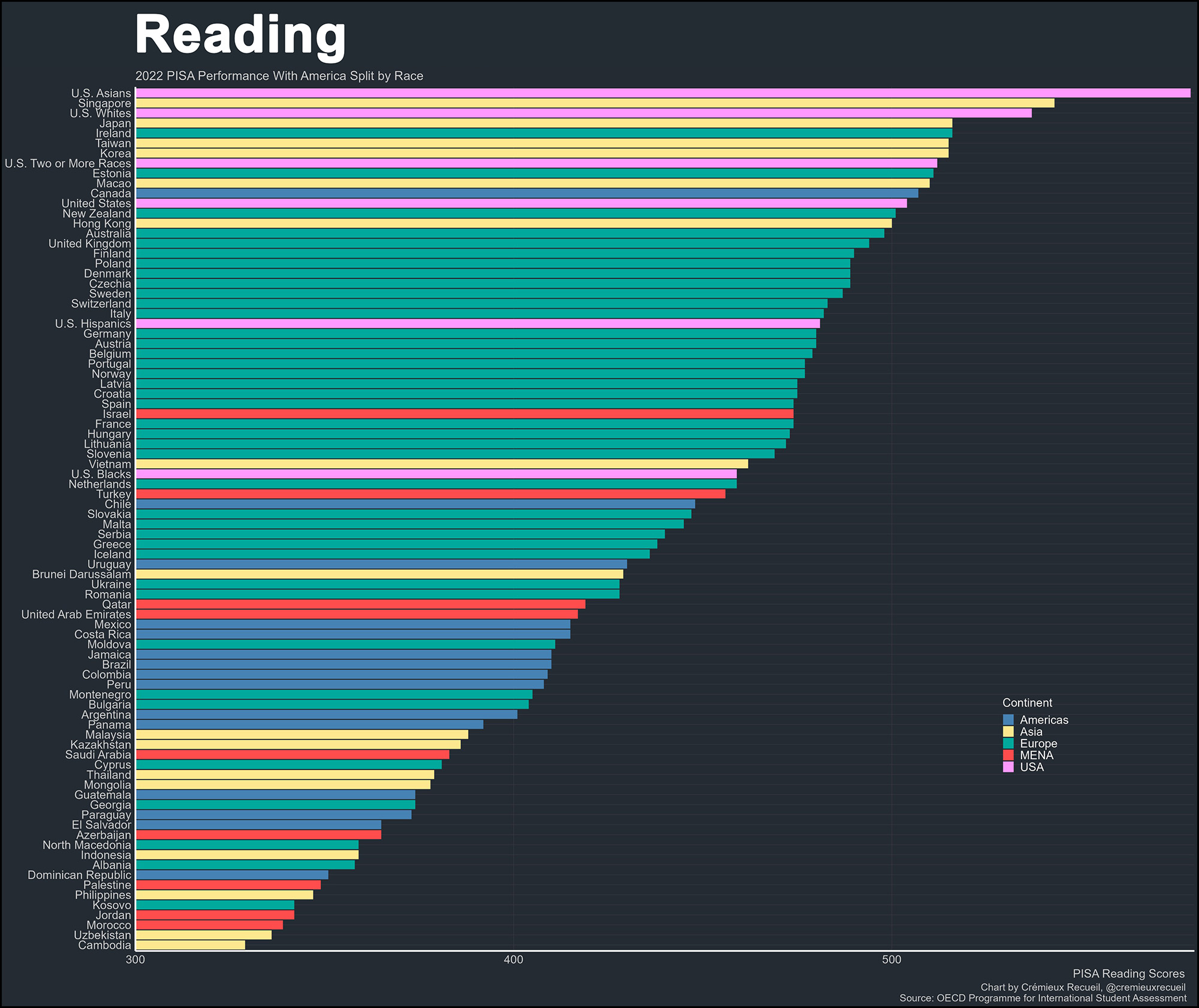
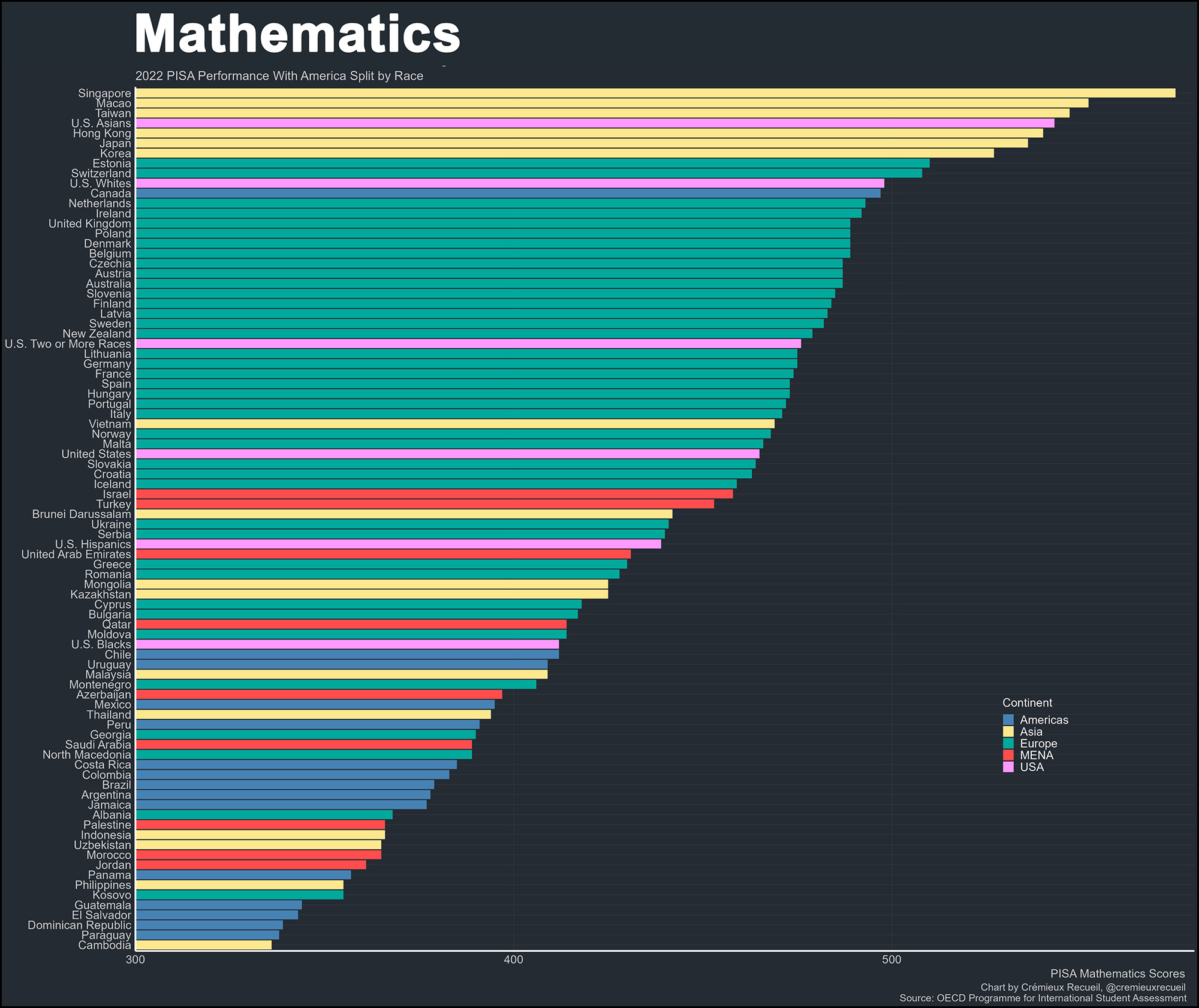
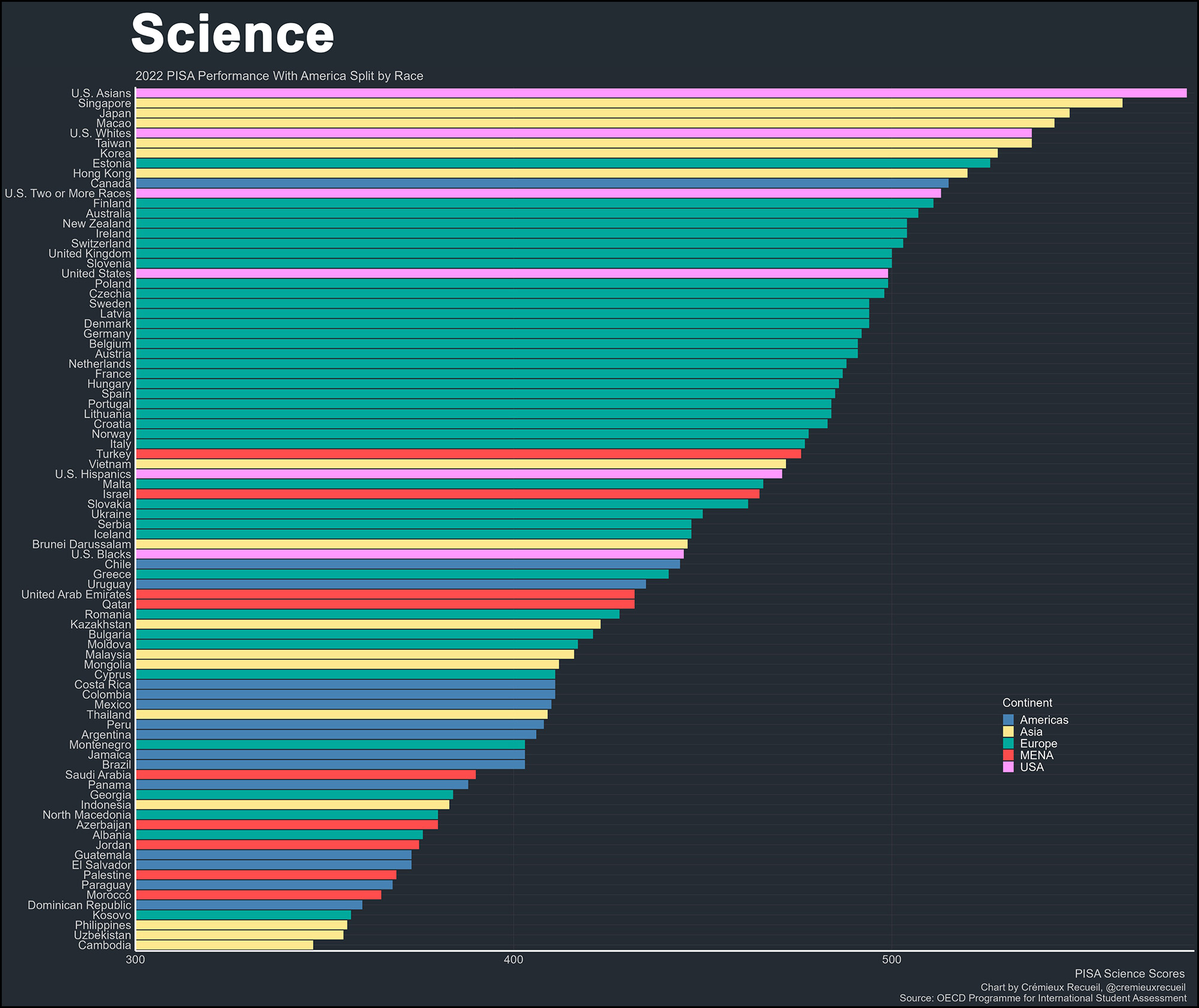
They have taken in 118,000 non Finish speaking asylum seekers since 1990 or 2% of their population. That is probably one of the biggest contributors to lower test scores.
Wait, you mean it might have less to do with the system than who the students are? Do tell.
Baseline educational success (ie things like high school graduation or grade level reading/writing/math) is often really a measure of poverty rather than the education system. In other words, how a kid does in school is a proxy.
When measuring the success of a system, I'm more interested in the marginal gain the system provides. It's easy to get a child of two highly educated and wealthy parents to graduate, score high on standardized tests, and go to college. The system that gets the child who is navigating poverty and/or the foster system to achieve graduate, score high on standardized tests, and go to college, now they're doing something. That's a place we should be focusing more research energy.
The international results are further proof that there is nothing magical about phonics - and of course that the US has been doing OK even if the methods are not phonics-approved.
The countries that do worse than US whites range from almost completely phonetic (Spanish, Italian, Russian) to completely non-phonetic (traditional Chinese). The proficiency does not rank by the degree to which the languages are phonetic.
This is not to say that familiarizing students with the alphabet is not useful, or even critical for some, or that "whole language" may not have been a wrong turn in some ways. But apparently other things are more important for average proficiency, if not necessarily for individual students.
If phonics were as miraculous as some people claim, surely by now, after over 60 years of controversy, some states or just districts would have adopted it and soared over everyone else. Phonics is almost the Republican party line - do red states perform better than blue states?
With all the math teachers I had the topic always seemed bound up with aggressive and belligerent manliness and anger management disorder, even when the teacher was a woman.
Until I went to college where the teacher was Egyptian, who was overwhelmed with guilt because he could hardly speak English and thought it was all his fault so he gave everyone a passing grade.
"...The problem the United States has with its educational system is simple and extremely well known: we do a crappy job of teaching poor Black and Hispanic kids. ..."
Compared to who? Which countries do better?
The problem with US education is simple and ought to be well known but isn't. It is literally the only problem we have that can be solved by throwing money at it.
Until she retired, my wife taught music in K-12. When she was doing K-5, she was good friends with the art teacher. The each taught over 600 kids each year, one day a week for every kid in the school. Their budget for a year of music and art? $100 per year.
What the fuck are you supposed to do with that? $100 can't even buy enough paper for 600 kids to draw on once a week for a year. I venture to guess (and I don't know where you'd get data on it) that we are the only major country who thinks it is just A-OK to put the cost of education on the back of the educator. No wonder we can't find good teachers. First we pay them shit, and then we make them pay the cost of educating other people's children. Our dimwit governor is all proud of himself every time he declares a sales tax holiday so teachers can buy teaching supplies without paying taxes. Fuck that noise.
And where does that hit the worst? In Title I schools, where my wife taught for the last decade of her career, where there is no PTA money, no fundraisers, and the student population changes every month as parents go from one apartment move-in special to another. She's seen the same kids come and go three times in a year.
How do you fix lack of money? You throw fucking money at it.
So use proceeds from the world's oldest profession? ...
How do you fix lack of money? You throw fucking money at it.
You can't possibly believe that, can you?
I think we ought to equalize funding between rich and poor school districts because it's the right thing to do (it is), not because we're going to see dramatically better results (we won't). NYC has one of the highest per student expenditure figures in the world. Not fair, you say, the education outcomes in NYC are what they are because of elevated poverty! To which I reply: exactly.
When it comes to education outcomes, socioeconomic status isn't everything. It's the only thing.*
*Ok, a bit of an exaggeration there. But only a bit!
"The problem with US education is simple and ought to be well known but isn't. It is literally the only problem we have that can be solved by throwing money at it."
This of course has been repeatedly tried. It doesn't work. Because trying to teach a dumb kid to be smart is like trying to teach a short kid to be tall.
Spliting up the US and comparing the subsets to the entire population of other countries is meaningless. I'm sure subsets of all the other countries would have the same kind of splits. Lower income and, in partricularly, longterm lower wealth subsets of a population, will usually show poorer education outcomes so it is no surprise this happens in the US. What would be more interesting is finding groups that score better that their social-economic profiles would predict.
Not really. Everyone (including US whites) has a wide range of income levels, but we're fairly unique in having a very large minority population (30+%).
...we're fairly unique in having a very large minority population (30+%).
Canada is now 30% non-white. I think the term they use is "visible minority."
(US is about ten points higher, I believe, although things get a little fuzzy when it comes to counting Hispanics.)
My point is subdiving one population any comparing them to undivided different population is not statistical valid. I'm interested in seeing economic subsets. I don't think you have demostrated the differences inrace results are not mostly economic and parental education achievement.These differences are very common.
This seems correct. Cant tell from Kevins response what he means by 'not really'.
Why do we self-flaggelate when something that most Euro-American people agree is absolutely OK works as intended? With the exception of the second great-grandkids of New England Abolitionists most What Foulks are Jim Dandy about not teaching them Uppity Ni##34s. And as for the W3!^@*ks, we all agree that we need many more kitchen staff and a whole lot of new house cleaners.
So what's not to like about not winning FISA?
Oh, yeah, we have to be FIRST at everything and countries which educate everybody well smoke us. Oh, well, there are costs to every good thing, amirite?
In case ANYone is wondering, the previous was, indeed, snark.
"Among countries of 10 million or more, US scores for white kids are the highest in the world in reading and fourth highest in math (behind Japan, Taiwan, and South Korea)."
I was flabbergasted to read that, given that the charts posted below very clearly read "U.S. Asians" at first place for reading and fourth place for math, but I see nobody in the comments noticed that either.
White kids in the U.S. come in at third in reading (behind U.S. Asians and Singapore) and tenth in math. U.S. Asians are first in science with U.S. whites coming in fifth.
For whatever it may be worth, Singapore's population is 5.45 million.
Never mind the crappy job we're doing teaching Black and Hispanic kids, why does our education system do a better job with Asian kids than White kids?
At what point will we address this obvious pro-Asian bias in our school system? 😛
Pingback: এই সপ্তাহের "রাউন্ড-আপ" নীতি সংক্রান্ত বিষয়ের উপর দরকারী পোস্ট এবং নিবন্ধগুলি - Amrita Bazar
Pingback: This Week’s “Round-Up” Of Useful Posts & Articles On Ed Policy Issues – Educational OnBoard